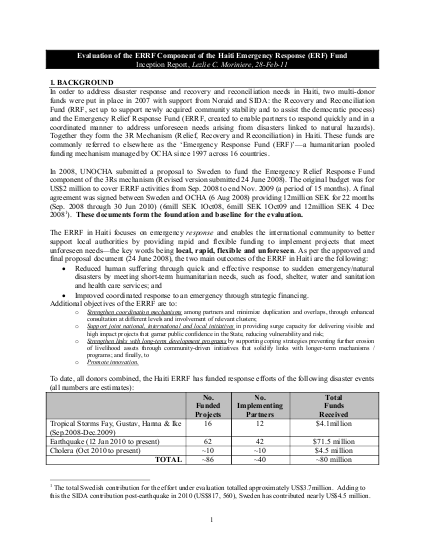Inception Report

This is the inception report for an evaluation of the Emergency Relief Response Fund (ERRF) in Haiti. It notes two clarifications about the scope of the evaluation as described in the terms of reference. It includes a review of stakeholder responsibilities, the methodology to be used, the timeframe, the tentative field mission plan, the proposed table of contents for the final report, a list of key contacts, the evaluation questions and the methods to be used to answer them, a stakeholder map, the questions for the planned survey, and the interview guide for key informants.
Objectives: The purpose of the evaluation is to take stock of the ERRF since its 2008 activation in Haiti and to provide feedback on its relevance, effectiveness, efficiency and connectedness to stakeholders, with the aim of highlighting ERRF operational strengths and areas for improvement while also noting anecdotal evidence on results that may be directly attributed to the ERRF. The evaluation is a part of the requirement set under the ERRF donor agreement conditions.
The evaluation will explore how the ERRF is contributing towards a more timely, predictable, effective and accountable humanitarian response. It will assess both the management processes and operational aspects of the fund.
The objectives of the evaluation are to:
1) Assess to what extent the ERRF was able to meet its primary objective of supporting humanitarian organizations and local authorities in responding to natural disasters by providing rapid and flexible funding to partners to implement projects to meet unforeseen needs, as well as additional objectives of strengthening coordination mechanisms (including the role of HC and of the clusters), supporting joint initiatives, and strengthening links with the long term development processes;
2) Identify strengths and weaknesses in operational processes (i.e. governance, project selection,decision making process for fund allocations);
3) Review standard ALNAP criteria including: the relevance, effectiveness, efficiency, connectedness and cross-cutting issues (such as gender and vulnerable groups);
4) Identify (a) any improvements that would help strengthen the functioning of the ERRF, and (b) areas working particularly well which might be systematized and applied in other ERRF contexts.
Resource collections
- Coordination
- Prioritisation
- UN Habitat - Urban Response Collection
- Urban Response - Urban Crisis Preparedness and Risk Reduction
- Urban Response Collection - Community Engagement and Social Cohesion
- Urban Response Collection - Economic Recovery
- Urban Response Collection - Environment and Climate Change
- Urban Response Collection - Housing, Land and Property
- Urban Response Collection - Urban Crisis Response, Recovery and Reconstruction
- Urban Response Collection - Urban Resilience